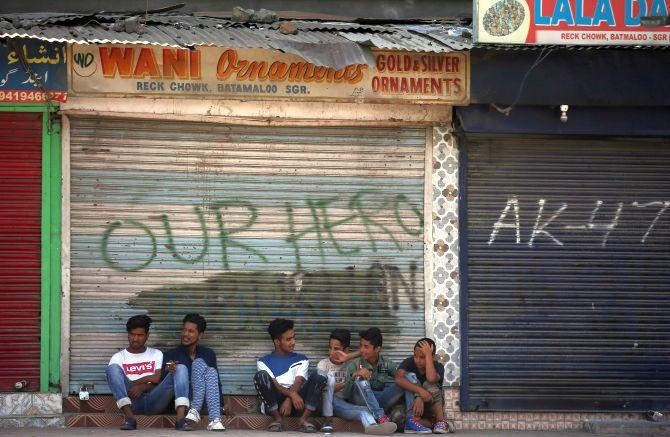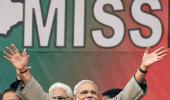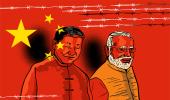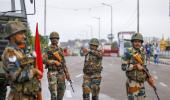'Article 370 was anathema to our traditional values and an oxymoron in an otherwise noble Constitution. It had to go,' says Vivek Gumaste.

The shrill, indignant and raucous counter arguments eddying into the air in response to the abrogation of Article 370 are mere duds, hackneyed outdated clichés and time-tested myths that have bitten the dust umpteen times.
To reiterate these notions at this juncture is ridiculously redundant and an inane exercise that appropriates the dictum arguing for the sake of argument; an exhibition of mental bankruptcy emanating from a politically irrelevant, ideologically rejected and electorally discredit coterie.
Noted columnist Pratap Banu Mehta, writing (external link) in the Indian Express under a highly emotive title, The Story of Indian democracy written in Blood and Betrayal, ()dubs the Indian Republic under the BJP as ‘jackboot’ and surmises: 'India has betrayed its own constitutional promises'.
Omar Abdullah, the former chief minister of Jammu and Kashmir, called the action ‘unilateral, illegal and unconstitutional’, and senior Congress leader and former home minister P Chidambaram declared: 'Today is a black day in the constitutional history of India'.
How valid is this inflammatory charge of constitutional heresy?
The unconstitutionality that these worthies are referring to is a narrow interpretation confined to the officialese of the Constitution, akin to bureaucratic nitpicking.
True, the government’s action may not strictly subscribe to the letter of the Constitution (the Constituent Assembly of J&K doesn’t exist, etc) but redeems itself in the larger picture by resonating with the heart and spirit of the Constitution; it does away with an erroneous and dysfunctional directive.
Article 370 was a flawed statute to begin with. For one, it was crafty ploy engineered by Sheikh Abdullah who envisioned himself becoming the supreme leader of a sovereign state in the future by exploiting this concession-- made possible by a pliant Jawaharlal Nehru.
Two, it was hastily introduced into the Constitution by the Constituent Assembly over the opposition of the architect of the Indian Constitution Dr BR Ambedkar who remarked: 'To give consent to this proposal, would be a treacherous thing against the interests of India and I, as the law minister of India, will never do it' (Balraj Madhok, Organiser, Nov 14, 2004).
Moreover, the contention that Article 370 was a popular refrain of all residents of the state of Jammu and Kashmir is a myth. At best it was a sectarian demand of the Muslims of Kashmir executed through dubious means.
The Praja Parishad (representing the Hindus of Jammu) was vehemently opposed to Article 370 and responded with the cry: 'Ek deshmein do vidhan, do pradhan, do nishan… nahin chalenge, nahin chalenge' (one country cannot have 2 constitutions, 2 heads of state and 2 flags).
Dr Syama Prasad Mookerjee, the first president of the Bharatiya Jan Sangh (forerunner of the BJP) travelled to Kashmir and led this movement from the front; his unflinching support for this movement led to his arrest and eventual death in custody. The movement itself was brutally crushed by draconian measures adopted by the state government:
'Through the winter of 1952/53 the Praja Parishad and the state government remained locked in conflict. Protesters would remove the state flag from government buildings and place Indian flags in their stead. They would be arrested …a Parishad member Mela Ram was shot by the police... By the end of April 1953, 1300 people had been arrested' (Ramachandra Guha, India After Gandhi).
Additionally, to circumvent legislative opposition to Article 370, the Praja Parishad was prevented from contesting the Kashmir Constituent Assembly elections of 1951 by intentionally disqualifying its candidates. The result: all 75 seats were won by Sheikh Abdullah’s National Conference and he was elected unopposed as the prime minister of J&K; any opposition to Article 370 was effectively stifled.
So, can there be anything legitimate about a decree effected by violent suppression of dissent? The answer has to be in the negative.
Subsequently, Article 370 was exploited and abused by the political establishment in Kashmir to sustain a state that defied everything that was right in our Constitution and our tradition: discrimination, religious tolerance and non-violence; it gave credibility to a parallel interpretation of our Constitution to create a rogue state within a democratic country.
The Constitution is a mere piece of paper with extensive verbiage; the words become meaningful only when translated into action, honoured or respected. It is not the government's duty alone to uphold the values enshrined in our Constitution, it befalls upon all of us, each and every Indian citizen, to safeguard these principles.
The most audacious and violent betrayal of our Constitution occurred on that fateful night in 1990 when a quarter million Indian citizens were driven out of their homes because they were Hindus and seven million Kashmiri Muslims stood on the sidelines feigning helplessness against a few hundred terrorists -- an act of unabashed ethnic cleansing for which the Kashmiri Muslims must be held responsible to some extent.
Kashmiri society murdered our Constitution on that fateful night and lost all right to invoke it; so did the liberal champions in our midst who chose to remain silent then and continue to do so in the face of what is arguably the most extensive act of religious sectarianism in independent India.
Any attempt to allude to the Constitution in the current context is a trifle specious.
All the chief ministers of Jammu and Kashmir have been Muslims as though conforming to an unwritten code, despite Hindus constituting 33 percent of the combined population of the state, another clear example how Article 370 and its separatist undertone have encouraged a religious partisanship.
In contrast, there are innumerable instances of Muslims being elected as CMs of Hindu majority states: Abdul Gafoor (Bihar; Muslim population 16.5%) and Abdul Rehman Antulay (Maharashtra; Muslim population 10%) are few names that come to mind.
Last but not the least, Article 370 became the seed of a toxic separatism that encouraged violence both on the streets of Kashmir and the tacit teaming up with Pakistan to unleash a reign of terror across not only Kashmir but the entire stretch of the country; a continuing train of terrorism that even reached the doors of our Parliament, the repository of our democracy. It is a bit rich when anyone invokes our Constitution to defend this warped narrative of Kashmir.
Prophets of doom foretell an apocalypse in the period post the eradication of Article 370.
Pratap Bhanu Mehta writes: 'But even if Kashmir resigns to its fate, pummelled by military might, the prospect of radicalisation in the rest of the country cannot be ruled out. There are already incipient signs of that. The theatre of political violence will shift. In the context of the communally sensitive arc from UP to Bengal and in Kerala, India will seem more fragile.'
This is not a valid argument. Fear of radicalisation in other areas is not justification enough to allow the proliferation of radicalisation in Kashmir; it is an indication of outright pusillanimity that has been the bane of modern India and the pathogenesis of our shocking inertia in the face of rampant terrorism. A firm assertive response sends out a strong message to mischief-mongers elsewhere that violence will not stand in a robust democratic republic.
As to Mr Mehta’s lament that ‘Indian democracy is failing', it is the exact opposite. For once an Indian government is proactively acting to uphold our constitutional charter. The government's decision must be celebrated as a championship of human dignity and human values in keeping with the true spirit of the Indian Constitution.
Agreed that scrapping Article 370 alone may not be the ultimate panacea for the Kashmir imbroglio, a lot more needs to be done. But it is a symbolic first step in the process of dismantling a malignant local establishment that has thrived under its aegis by promoting disharmony and chaos at the cost of development.
Article 370 was essentially an instrument of blackmail with Kashmiri politicians constantly threatening the rest of India that tinkering with it would nullify Kashmir’s accession to India; a bluff that had to be called.
But above all, Article 370 was anathema to our traditional values and an oxymoron in an otherwise noble Constitution. It had to go to salvage the soul of a nation and the meaning of the Constitution; a decision long overdue.
US-based academic and political commentator Vivek Gumaste is the author of My India: Musings of a Patriot.











 © 2025
© 2025